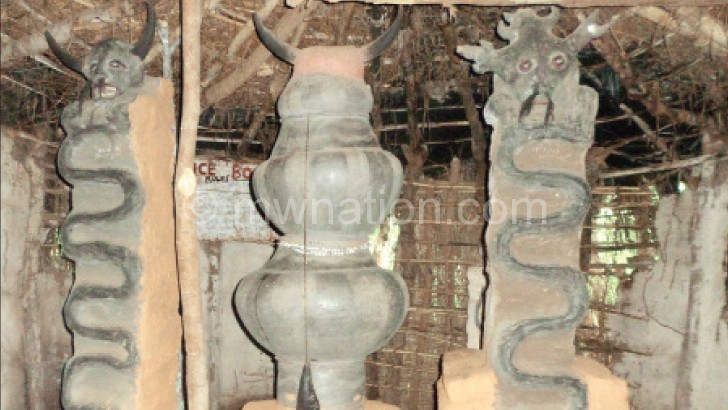Connecting the past
The message in the songs they sing when they enter the room is full of praise. There is, however, a swift change in tone as the message turns into a prayer—for blessings of rain, cleansing of plagues, of diseases or restoration of holiness.
It is not the real deal, though; after all, it is raining outside the rondavel. And by their own admission, the rains have been adequate this season, hence they expect bumper harvests from their fields at the end of the growing season.
But their assurance should not fool you into losing focus about what is taking place.
In the round hut, two towering serpentine-like objects with horned heads—quite hard to tell which animals they represent—and a pile of clay pots with horns at the top and on a string in front of it, form a foreboding spectacle that should strike fear down your spine.

seeks to preserve Phoka culture
The deafening hand-clapping that barely masks the incantations should increase the fear and force you to look at these images through the corner of your eye.
You only get the relief when you move to the next room. But you are not completely safe. Where you go is a world that should give you the picture of what the world of talismans is real.
In this room, you see pestles marked with red crosses and with tortoise shells attached to them, horns of various animals either raised or strewn on the floor or gourds and calabashes with their mouths sealed. But the issue is not just about the scare!
“This is an initiative that seeks to keep alive traditions of our forefathers and connect current and future generations to their forefathers’ way of life,” said Abel Nyasulu, chairperson and founder of the Kandewe Village Community Tourism Project.
“We have a collection of things that our forefathers used as part of their traditions. Among them are the pestles and mortars, musical instruments, objects used to foretell the future and tools and implements.”
The three objects in the round hut represent the gods to whom the forefathers of the Phoka prayed to whenever they lacked.
The gods were thought to live in the hills and whenever the people needed them, they would send a deputation of women who had reached menopause and old men, carrying various offerings including beer.
The praise-singing and incantations you will hear when you visit the site at Bale along the M1 Road after Phwezi in Rumphi are reminiscent of what happened at the prayer sites. When their prayers had been answered, the offerings would be consumed.
“Our forefathers used to walk long distances, such as trekking to South Africa, because there were no other means of transport. As such, they had to ask the spirits how the journey, including hunting, would be before they embarked on it. They used the pestle to get the answers even on how to cure a disease.
“As they walked, they would be playing a kalimba and cure themselves of the pain that the long walk would be bringing them. We have all the important instruments our forefathers used for the current and future generations to learn from,” added Nyasulu.
He said communities in the area started the initiative in 2005, and, with the fee they get from people visiting the site, they have been working on reviving all the old traditions for the benefit of the present and future generations.
The initiative is steered by a 10-member committee.
Chairperson for the initiative’s board of trustees, Julius Mkandawire, who is also acting principal group village head Chamazongwe, said there is coordination among people around the area in moving the initiative forward.
“You should agree with me that most of the traditions of our forefathers have died because of civilisation and settlements by some tribes among others. Everyone understands that our children will not appreciate where they are coming from if initiatives like this are not promoted.
“We all agree on the need to teach our children the traditions of our forefathers so that they know where they are coming from and what they are,” he said.
Loveness Nyirenda, a member of the committee, said current and future generations risk growing up ignorant because most of their forefathers’ traditions have died.
“Through this initiative, we are telling our children what we were doing. We were covering ourselves in tree bulks we beat up to soften. We were sleeping by fires and developed mbala on our legs because we did not have blankets. That is not the case today.
“We had lice all over our bodies and you would be seeing some in my head today. But we don’t have such things today because we lead a smart life. We use this initiative to connect our children to where we are coming from,” she said.





